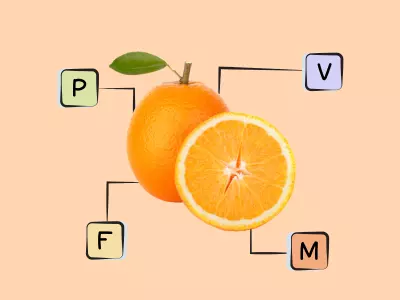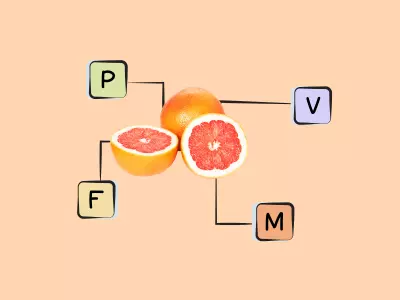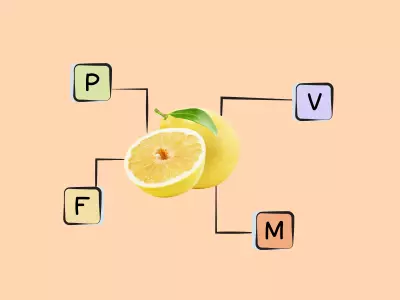Table of Contents[Hide][Show]
Health Benefits of Citrus Fruits
A juicy orange, a flavorful grapefruit, a sweet tangerine… the citrus family provides us with some of our most well-loved fruits! And along with being delicious, their impressive health benefits make them absolutely worth including in our diets.
Citrus fruits includes the familiar oranges (there are over 600 different kinds!), grapefruit, limes, lemons, and tangerines, but also some lesser-known members such as ugli fruit, yuzu, kumquat, citron, bergamots, Buddha’s hand, and pomelos. Many of these fruits aren’t separate species, but hybrids of other existing citrus fruits (for example, grapefruits are actually a hybrid of the pomelo and sweet orange, and tangelos are a hybrid of either mandarin oranges or tangerines and grapefruit!). Like kiwis, citrus fruits are technically a type of berry. And despite their popularity today, citrus wasn’t always so abundant: lemons were once so rare that they were given to kings as gifts!
Along with being delicious, the impressive health benefits of citrus fruit make them absolutely worth including in our diets. In particular, eating citrus fruit regularly is associated with reduced risk of cardiovascular disease, depression, dementia and all-cause mortality.
Citrus Fruits Reduce Cardiovascular Disease, Depression and Dementia
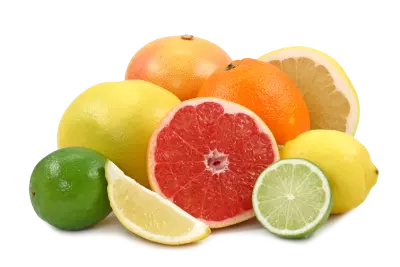
A 2011 cohort study of 10,623 Japanese adults with no history of cardiovascular disease found that near-daily intake of citrus fruit (compared with infrequent intake of citrus fruit) was associated with a 43% reduced risk of cardiovascular disease in men and 49% reduced risk in women.
A prospective cohort study following 82,643 women from the Nurses’ Health Study and Nurses’ Health Study II, throughout a 10-year period, showed an inverse association with depression risk in participants who consumed 2 or greater servings per day of citrus fruit or juices as compared with less than one serving per week (18% lower risk).
Frequent citrus consumption was also associated with a lower risk of dementia in the 2006 Osaka Cohort Study looking at impact of daily citrus intake in 13,373 elderly Japanese participants over 5.7 years. Overall, there was a decrease in incident dementia in participants who consumed citrus fruit 3 to 4 times per week (8% lower) and almost every day (14% lower) as compared to those who consumed citrus 2 or fewer times per week.
A 2017 systematic review and meta-analysis of 95 studies found that citrus (high versus low consumption) is significantly associated with lower risk of cardiovascular disease and mortality:
- total stroke (up to a 26% lower risk),
- ischemic stroke (up to 22% lower risk),
- hemorrhagic (up to 26% lower risk),
- coronary heart disease (up to 9% lower risk),
- cardiovascular disease (up to 22% lower risk), and
- all-cause mortality (up to 10% lower risk).
Those are some very impressive benefits to cardiovascular disease risk and neurological health!
Learn What Foods to *ADD* to Your Diet
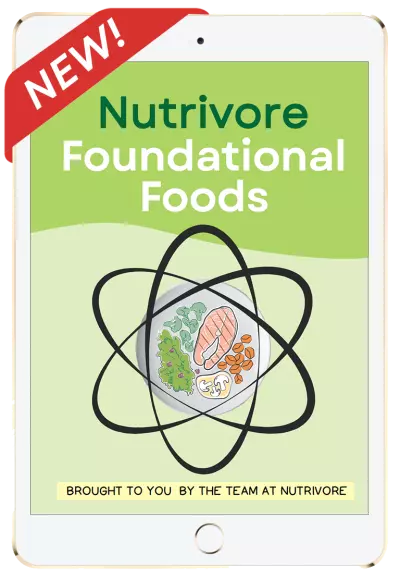
Nutrivore Foundational Foods
Learn what makes the 12 Nutrivore foundational food families nutritionally unique, their health benefits, which options are the most nutrient dense, how much of them to eat, plus various fun facts, practical pointers, and busting of common myths.
This very helpful resource will introduce you to new foods and expand your nutrition knowledge, making food choices easier!
Buy now for instant digital access.
Examples of Citrus Fruits
- blood orange
- Buddha’s hand
- citron
- clementine
- grapefruit
- kaffir lime
- key lime
- kumquat
- lemon
- lime
- mandarin
- Meyer lemon
- orange
- pomelo
- tangerine
Nutrients in Citrus Fruits
Easily track your servings of Nutrivore Foundational Foods!
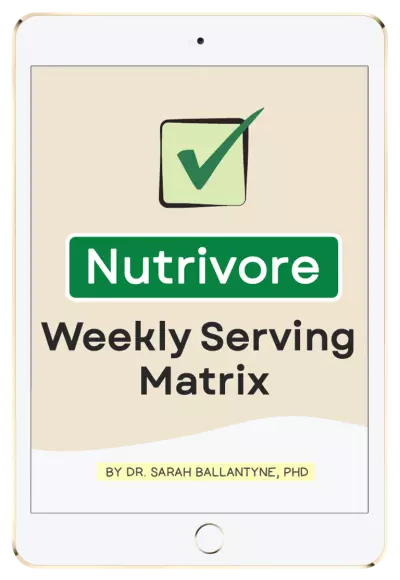
The Nutrivore Weekly Serving Matrix
The Nutrivore Weekly Serving Matrix digital resource is an easy-to-use and flexible weekly checklist designed to help you maximize nutrient-density and meet serving suggestions of Nutrivore foundational foods, all without having to weigh or measure your foods!
Includes a 22-page instructional guide and downloadable interactive guides.
Buy now for instant digital access.
Help me to keep building Nutrivore.com

I’m working on writing more awesome articles on this topic to be featured right here on this webpage. If you’re enjoying the content my team and I have created thus far and would like to see more, you can support our efforts to keep building out this site by joining the Nutrivore community on Patreon!
Plus every month, you’ll gain exclusive access to a *NEW* Q&A and behind-the-scenes podcast episode, a new e-book in a series, nutrient fun factsheet, and more! Sign up now and also get 5 free Nutrivore guides as a welcome gift! Win-win-win!
Citations
Expand to see all scientific references for this article.
Abeysinghe DC, et al. “Bioactive compounds and antioxidant capacities in different edible tissues of citrus fruit of four species.” Food Chemistry 2007;104(4):1338-1344.
Aune D, Giovannucci E, Boffetta P, Fadnes LT, Keum N, Norat T, Greenwood DC, Riboli E, Vatten LJ, Tonstad S. Fruit and vegetable intake and the risk of cardiovascular disease, total cancer and all-cause mortality-a systematic review and dose-response meta-analysis of prospective studies. Int J Epidemiol. 2017 Jun 1;46(3):1029-1056. doi: 10.1093/ije/dyw319.
Chang SC, Cassidy A, Willett WC, Rimm EB, O’Reilly EJ, Okereke OI. Dietary flavonoid intake and risk of incident depression in midlife and older women. Am J Clin Nutr. 2016 Sep;104(3):704-14. doi: 10.3945/ajcn.115.124545.
Chanet A, Milenkovic D, Manach C, Mazur A, Morand C. Citrus flavanones: what is their role in cardiovascular protection? J Agric Food Chem. 2012 Sep 12;60(36):8809-22. doi: 10.1021/jf300669s.
Mahmoud AM, Hernández Bautista RJ, Sandhu MA, Hussein OE. Beneficial Effects of Citrus Flavonoids on Cardiovascular and Metabolic Health. Oxid Med Cell Longev. 2019 Mar 10;2019:5484138. doi: 10.1155/2019/5484138.
Patil BS, et al. “Potential Health Benefits of Citrus: An Overview.” ACS Symposium Series 2006;936:1-16.
Pontifex MG, Malik MMAH, Connell E, Müller M, Vauzour D. Citrus Polyphenols in Brain Health and Disease: Current Perspectives. Front Neurosci. 2021 Feb 19;15:640648. doi: 10.3389/fnins.2021.640648.
Schutte AE. Fruit intake and reduced risk of hypertension: are there any forbidden fruits? Eur J Prev Cardiol. 2020 Jan;27(1):36-38. doi: 10.1177/2047487319876767.
Wang L, Manson JE, Gaziano JM, Buring JE, Sesso HD. Fruit and vegetable intake and the risk of hypertension in middle-aged and older women. Am J Hypertens. 2012 Feb;25(2):180-9. doi: 10.1038/ajh.2011.186.
Yamada T, Hayasaka S, Shibata Y, Ojima T, Saegusa T, Gotoh T, Ishikawa S, Nakamura Y, Kayaba K; Jichi Medical School Cohort Study Group. Frequency of citrus fruit intake is associated with the incidence of cardiovascular disease: the Jichi Medical School cohort study. J Epidemiol. 2011;21(3):169-75. doi: 10.2188/jea.je20100084.
Zhang S, Tomata Y, Sugiyama K, Sugawara Y, Tsuji I. Citrus consumption and incident dementia in elderly Japanese: the Ohsaki Cohort 2006 Study. Br J Nutr. 2017 Apr;117(8):1174-1180. doi: 10.1017/S000711451700109X.




